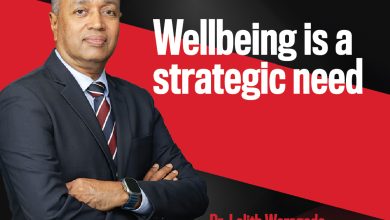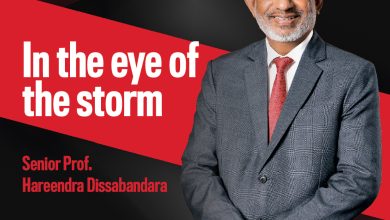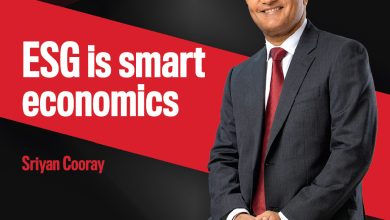MAS HOLDINGS
As the largest apparel tech company in the whole of South Asia, MAS Holdings provides ‘design-to-delivery solutions’ in apparel and textile manufacturing. In addition, it is renowned for its innovation-centric and people-oriented business model. Being home to more than 118,000 employees, MAS spans across 17 countries with design locations placed in key style centres worldwide. Catering to the demands of a dynamic and ever-changing industry, MAS’ portfolio has expanded exponentially, filtering into and revolutionising businesses across wearable tech, femtech, startups, logistics and fabric parks worldwide.
Q: How important is it to sustain respect in the workplace – especially during times of crisis?
Ilma Marikkar (IM): Respect is critical, always – and more so in turbulent times that truly test the values of an organisation.

Director Finance – MAS Active
A crisis such as the COVID-19 pandemic, as well as the current economic situation, intensifies job demands and drains resources whilst upending lives and livelihoods. This leads to a workforce that is physically burnt-out and emotionally drained – ultimately impacting their performance, creative thinking and workplace accidents.
In such times, we have learnt that how we translate words into action is what matters to our stakeholders. From workplace flexibility to infrastructure and community support, we truly commit to building a safety net for our employees; and their trust and commitment in turn drive customer loyalty.
Nemanthie Kooragamage (NK): Trust, mutual respect and honouring the value of every human being are part of our foundational values. To stay true to our purpose in times of crisis, we hold on even more tightly to these values.

Director Product Creation – Men’s Essentials COE & Sustainable Business, MAS Intimates
In our experience, doing this has benefitted our staff, customers, partners and business – because respect in the workplace helps to retain talent and enhance collaboration. It also reduces stress, increases workplace happiness and enables teams to perform at their best.
The MAS ‘Organisational Health Index’ improved during the pandemic years and we believe this is a result of diverse initiatives that we rolled out to support employee wellbeing and work-life balance – while fostering diversity and inclusion.
This index, as well as the respect we earned, was a key indicator that we were doing the right thing in challenging times.
Q: How can ‘corporate respect’ help organisations to tide through times of crisis such as these?
IM: In times of crisis, organisations face external challenges that affect their performance – many of which are beyond organisational control. The impact of the pandemic on manufacturing is an example of an instance where regulations and safety measures directly stifle operations.
Given the complexities of such crises however, if employees internally were to lose faith in the organisation or customers withdrew orders, the business’ operations would come to a standstill.
It is corporate respect gained through support programmes, and instilling a strong value system and work culture, which drives trust and empowerment. This respect can shield an organisation from risk; and instead, makes it resilient and robust in the face of any crisis.
Q: What are the ways in which corporate reputation gives businesses a competitive edge?
IM: The positive perception of a brand delivers value far beyond a price tag. It encourages stakeholders to engage with the organisation. For example, the value of mutual trust makes it easy to do business, satisfy customers, increase revenue, retain talent and build loyalty – from both employees and customers.
Q: In what ways does social responsibility continue to be a part of the ‘corporate respect’ equation?
NK: Communities have been facing severe challenges over the past couple of years and are very much in need of support. While trust in established systems of governance is declining, there is an increase in local solidarity and opportunity for organisations such as MAS to strengthen long-term partnerships with the community.
At MAS, building thriving communities is one of our 12 commitments in the larger sustainability strategy, which is the MAS ‘Plan For Change.’
In 2021, we carried out over 400 projects across the country – covering health, education and the environment. Responding to critical needs, we conducted medical clinics in the areas where we operate, and provided medical equipment and infrastructure, setting up COVID care centres and refurbishing hospitals. These were simply part of our operations as a responsible organisation.
It is the same for our commitment to more sustainable products and a safer planet. Our efforts in reducing emissions, chemical and waste management; safeguarding water and biodiversity; pushing the boundaries to do better by our planet – all of these in turn strengthen the respect we earn as an organisation.
QUICK-FIRE ROUND
Three recommendations to revive Sri Lanka’s economy
Adopt an economic transformation to create value today, and for the future.
Instil consistent and stable macroeconomic policies – backed by credible leaders with integrity and capability.
Promote an export-oriented growth model covering both goods and services to attract foreign investments.
Three most admired global business leaders
Deshamanya Mahesh Amalean
Yvon Chouinard
Christine Lagarde
Q: How does a corporate’s commitment to continuous innovation help it to garner respect?
NK: Innovation is essential for growth and transformation. It could be through new technology, supply chain reengineering, revolutionising business models or making simple changes that create meaningful impact. Businesses that continue to innovate naturally garner respect in their industries and among consumers.
As a co-creator and manufacturer, we at MAS aspire to innovate products that can last longer, use less resources, be good for the wearer and get recycled after use. It is not only about innovating but also sustainable innovation.
Some examples of our progress include innovations that enable products to be coloured and finished without the use of water, technologies that eliminate waste in the manufacturing process, fabric made with recycled plastic, 100 percent natural dyes and business models that reduce environmental impact.
We also look beyond product. For example, innovative thinking led to the idea of aerial reforestation whereby we conducted a project to air-drop plant seeds wrapped in fertile soil over forest areas not accessible by foot. By 2021, we had covered 180 acres of forest land.
Our recent innovation – the ‘ocean strainer’ solution, which traps and collects trash – preventing garbage from flowing into the sea from inland waterways was a finalist in the ‘water category’ for Fast Company’s World Changing Ideas Award 2022.
These innovations have earned us respect and recognition, positioning MAS as a key player and change maker in the apparel industry globally.
While pursuing innovation, MAS Holdings strives to drive positive impact by creating sustainable change in three areas of focus: products, lives and planet. Through such initiatives, the group aims to inspire all its employees to be change makers – enabling dreams and enriching the fabric of life on our planet.
Telephone 4796444 | Email info@masholdings.com | Website www.masholdings.com









